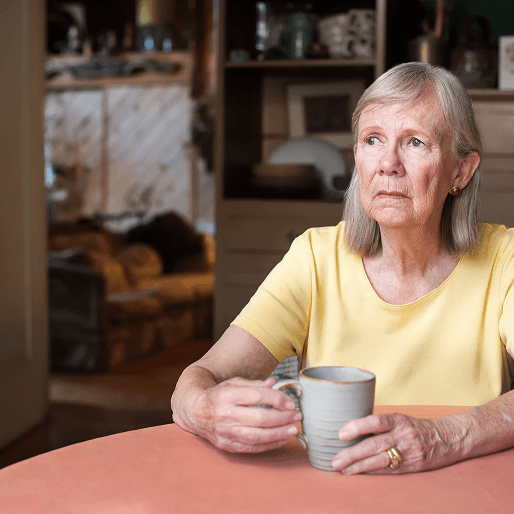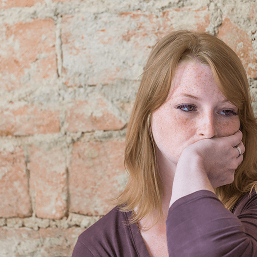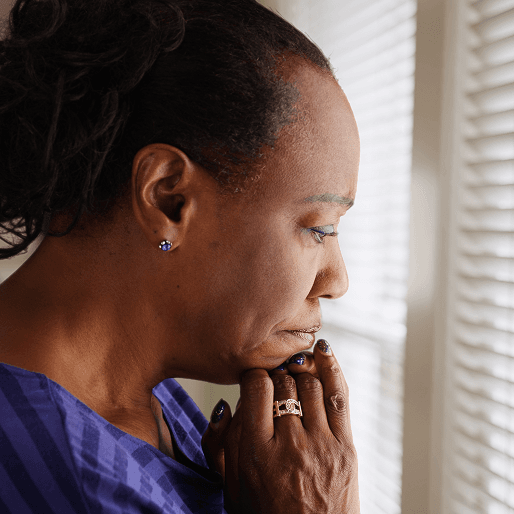
With Dr. Elisha Goldstein
Anxiety and depression can result from a loop of negative thoughts, emotions and behaviors. Through this short course, you’ll learn how this loop works and what you can do to break its cycle for a happier, healthier state of mind.
Course
Anxiety

Living with anxiety may be overwhelming, but these tips will help you calm down quickly if you're having a difficult time at the moment.
Learn how to tell the difference between normal anxiety and an anxiety disorder.
If your spouse or dating partner experiences anxiety symptoms, it’s natural to want to help. Here are a few expert-recommended ways to support them.
Most people feel anxiety at some point. Learn more about symptoms of anxiety disorders, how to reduce anxiety naturally, and when to seek professional help.
Depression

There are small steps you can take to help fight depression. Read on to learn how to incorporate them in a way that works for you.
Depression is a mood disorder that can affect a person’s daily life. Learn more here.
This video provides some tips for how to fight depression.
Eating disorders

Learn how to recognize the symptoms of anorexia, bulimia, binge eating disorder, pica, rumination disorder, and avoidant/restrictive food intake disorder.
A guide to the symptoms and treatments options for eating disorders, including anorexia nervosa, bulimia nervosa, and binge eating disorder.
Most of us overeat on occasion, such as during the holidays, but frequent and compulsive overeating may be a sign of binge eating disorder.
Two experts explain what disordered eating is, how it's different from eating disorders, who it can affect, how it's treated, and more.
Abuse

When discussing domestic violence, many people immediately think about physical abuse. But domestic violence can take many forms — not just physical.
Being sexually abused as a child can have lasting effects on an individual.
This video points out signs to look out for in mental and emotional abuse,

Here are the current options to manage ADHD symptoms in children and adults.
If the symptoms of ADHD are affecting your job performance, there are practical ways to work through the difficulties.
If you live with ADHD, you know that it's a complex condition. Here's a top-to-bottom look at it, from causes and testing to natural remedies and tips for coping.
Many adults with attention deficit hyperactivity disorder have never been diagnosed. Get the facts on ADHD symptoms in adults, testing, and treatment.
Autism

Autism treatment often involves a combination of different therapies. For some, medication may also play a role. We’ll go over all the different options that can help to manage autism symptoms. You’ll also learn some tips for navigating the world of alternative autism treatments safely.
Though an autism diagnosis may bring challenges, it can also have positive effects. Here's how autism may affect families.
Autism spectrum disorder (ASD) is a group of developmental factors that can cause social and communication issues. Learn more about testing and diagnosis.
Autism symptoms in kids involve social skills, communication, behavior, and more. We explain what to look for, how autism is diagnosed, and treatment options for kids.
Bipolar disorder

Learn how symptoms may differ between bipolar I and bipolar II disorders and what you can do for diagnosis, treatment, support options, and more.
Bipolar disorder, formerly manic depression, causes extreme mood shifts ranging from mania to depression. Learn symptoms, diagnosis, treatment, and more.
Knowing how to help someone with bipolar disorder can be a challenge. Explore 7 ways to support a friend or loved one with this unpredictable condition.
While there's no cure for bipolar disorder, there are lifestyle changes and treatment plans that can help prevent bipolar episode triggers.
Grief and loss

Learn the five stages of grief and ways to cope with loss.
It’s common to experience grief in our workplace as well as our personal lives.
Learn from a psychologist how sadness and joy can — and often do — coexist. You’ll learn a simple strategy for finding joy in even the most difficult of times.
The most important part of helping someone with grief is to keep in mind that each person can handle a loss differently. Here are some helpful tips.
Mental health care

There are countless approaches to therapy. We’ll go over some of the most popular types, including how they work and the conditions they work best for. You’ll also learn how to narrow down your choices to find the option that’s best for you.
Behavioral health care focuses on an individual's psychological wellness. It is occasionally referred to as mental health care.
Learn how to help your mental and physical health providers work together to support your whole self
Learn about the benefits of therapy and what to expect. A little knowledge and prep can help you make the most of it.
Obsessive compulsive disorder

If you live with OCD, you'll have two kinds of symptoms: obsessions and compulsions. While OCD can cause distress, it's likely that treatment will bring relief.
OCD symptoms are separated into two categories: obsessions and compulsions. But what do these look like, and how are they related?
Obsessive-compulsive disorder (OCD) is often treated with a combination of therapy and medication. Learn more about OCD treatment options.
If you've been living with OCD, it might feel like obsessions and compulsions control your life, but the right care strategies for you can help.
Personality disorders

Cluster A personality disorders include paranoid, schizoid, and schizotypal personalities and are characterized by these traits and symptoms.
People with dependent personality disorder (DPD) may require constant reassurance. We tell you the facts and how to support someone living with DPD.
If you’re living with BPD, an important part of treatment is finding the right support. Here are some options and how you can take that first step.
Antisocial personality disorder is often characterized by a disregard for others and right or wrong, but there's so much more to the condition.
Phobias

Even though phobias are fairly common, not many people seek help or support for them. Learn about the types of phobias and what treatments could help.
Having a phobia can be exhausting and scary at times. But there are many ways you can help ease your anxiety and fear.
A specific phobia is an excessive fear of a certain object or situation that lasts at least 6 months. Learn about their symptoms and treatments here.
Schizophrenia

Schizophrenia is characterized by delusions and hallucinations, and is generally treated by medications and psychotherapy. Learn more about schizophrenia causes, symptoms, resources, and treatment.
Schizophrenia is a challenging mental illness characterized by a broad range of symptoms. Learn about the 10 most common symptoms of schizophrenia.
There are three phases of schizophrenia: prodromal, active, and residual. Learn more here.
Schizophrenia is a complex and misunderstood condition. The idea that schizophrenia is untreatable is a myth. In fact, there are many effective treatments available. Learn more here.
Trauma

No two trauma recovery journeys take the exact same shape. Wherever your path takes you, these reminders can help smooth the road ahead.
Traumatic events can leave lasting emotional and physical effects—but healing is possible.
Developing coping strategies for PTSD can help you manage your symptoms and promote a better quality of life.
PTSD can be a challenging condition to live with. Having the support of a compassionate loved one can make a world of difference. Here’s how to get started.
